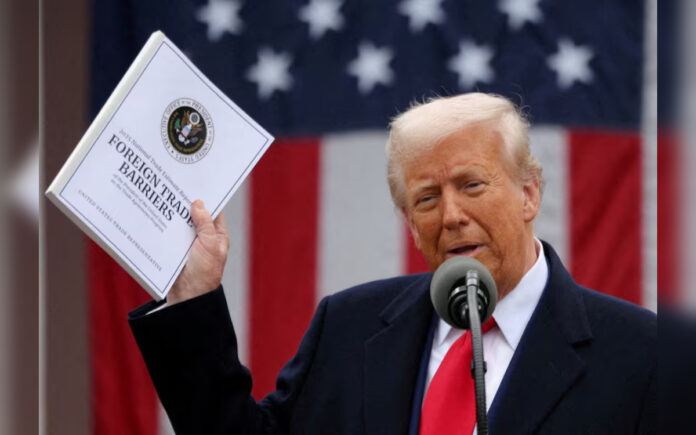Washington, DC: Global financial markets took another hit as U.S. President Donald Trump likened his sweeping tariff measures to “medicine”, insisting that foreign governments would need to pay “a lot of money” to remove them. The remarks added to growing investor anxiety, with Asian stock markets sharply lower and U.S. futures pointing to significant declines.
In early Monday trading, Asian equities posted broad-based losses amid concerns that the tariffs could spark higher consumer prices, weaken global demand, and push economies closer to recession. The selloff follows last week’s announcement of tariffs as high as 50%, which prompted swift retaliatory measures from China and rattled markets worldwide.
Speaking aboard Air Force One after a weekend in Florida, Trump downplayed the impact of market turmoil, saying, “I don’t want anything to go down. But sometimes you have to take medicine to fix something.” The comment came as global markets continue to reel from volatility that has erased trillions of dollars in value.
Trump said he had spoken with leaders from Europe and Asia over the weekend, many of whom urged him to reconsider the tariffs due to take effect this week. However, Trump remained firm: “They are coming to the table. They want to talk but there’s no talk unless they pay us a lot of money on a yearly basis.”
The administration’s tariff push has left investors and global policymakers grappling with uncertainty—unsure whether the measures are a long-term strategy or a temporary bargaining tool.
Also Read | US-China Tariff Fight Sparks Massive Selloff in Chinese Markets
On Sunday, several of Trump’s top economic advisers defended the tariffs in television interviews. Treasury Secretary Scott Bessent said that over 50 nations had initiated talks with the U.S. since the announcement, telling NBC News’ Meet the Press, “He’s created maximum leverage for himself.”
Commerce Secretary Howard Lutnick echoed that position on CBS News’ Face the Nation, stating the tariffs would remain in place “for days and weeks”.
Also Read | Unvaccinated Texas Child Dies Amid Growing Measles Outbreak; Kennedy Visits Bereaved Family
White House economic adviser Kevin Hassett attempted to calm fears that the tariffs were part of a political effort to influence the Federal Reserve, stressing there would be no “political coercion” of the central bank.
The economic implications are becoming clearer. JPMorgan economists have revised their outlook for U.S. growth, now expecting full-year GDP to shrink by 0.3%—a dramatic downgrade from the earlier 1.3% growth forecast. The unemployment rate is also projected to rise to 5.3%, up from the current 4.2%.



